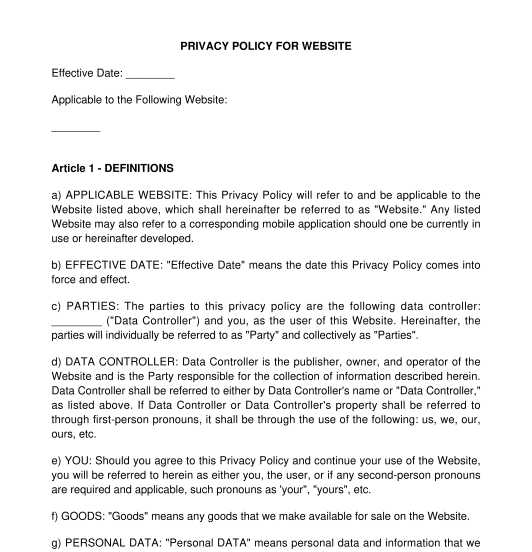 02/11/2025
02/11/2025

Answer a few questions and your document is created automatically.

Your document is ready! You will receive it in Word and PDF formats. You will be able to modify it.

 02/11/2025
02/11/2025
 Word and PDF
Word and PDF
 10 to 15 pages
10 to 15 pages



A Privacy Policy (Mobile App/Website) is a written document that explains to visitors of a website or mobile application what personal data the site collects about them when they browse its pages. This document also explains how and why this information is collected and the rights that visitors have with respect to these practices, and the manner in which a visitor can make a complaint.
A Privacy Policy Complaint (Mobile App/Website) is a policy specifically used on a website that informs visitors what information is collected and how it's used and the manner in which complaints are handled. On the other hand, a privacy policy of organization is used by private businesses such as offices where personal information of clients is obtained in the ordinary course of business. In other words, a privacy policy of organization is for specific information obtained from clients in the scope of business, meanwhile a Privacy Policy Complaint (Mobile App/Website) can apply to any website.
A privacy policy should at least contain:
Additionally, the document should state that the collection of personal data concerns only personal information that is necessary for the website or app.
The term "Personal data" refers to any information that can identify an individual, such as:
This information is vital to individuals and any compromise of this information can be damaging. The privacy policy provides to any visitor a right to oppose, which the company or organization must respect and enforce at the request of a visitor. The right to oppose allows individuals concerned to refuse that their information be used for certain purposes mentioned at the time of collection.
Individuals that provide personal information have certain rights. These include:
Once the document is ready, it may be added to a website or mobile app and placed in an easily accessible and intuitive location for visitors, such as the site's footer. The website or app owner will need to monitor complaints and address them as they arise.
The Personal Information Protection and Electronic Documents Act (S.C. 2000, c. 5) is a federal statute (law) that governs how private-sector organizations collect, use, and disclose personal information of individuals while in the course of commercial activities. Some Provinces have a piece of legislation that parallels this law, including Quebec, British Columbia, and Alberta.
You fill out a form. The document is created before your eyes as you respond to the questions.
At the end, you receive it in Word and PDF formats. You can modify it and reuse it.
Country: Canada (English)